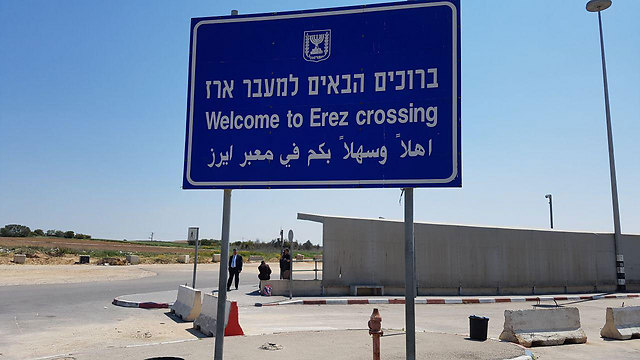

Hanegbi: Erez Crossing closure meant as warning to Hamas
Regional cooperation minister tells Ynet that issuing of 'yellow card' warning came in response to violent demonstrations staged by Palestinians on Gaza border, insists Bennett-Lieberman feud misrepresents 'almost complete consensus' in the Cabinet about Israel's actions against Hamas.
"It appears Hamas has begun recalculating its direction after a long period of rocket firing and terrorism. It's not enough, but if that's the direction they're going, we hope it'll become more prominent," Hanegbi told Ynet.
“We have seen in the last week a dramatic decrease in the scale of the attacks. We never promised anyone anything. We are dealing with terror. We are trying to strike it while on the brink of war, without it escalating into another unnecessary round of conflict,” he explained.
Hanegbi rejected the claim that direct negotiations were taking place between Israel and the Palestinians, but hinted that third parties were seeking to broker a ceasefire to end the prolonged period of violence.
“There are a lot of people with good intentions who are trying to save the Palestinians from themselves. There is no direct contact between Israel and Hamas, but we have made clear to the mediators as well: Quiet will be met with quiet. We did not initiate this battle and we have no interest in it. As long as it disappears from the view of our lives we will be happy,” Hanegbi stated.
He also addressed Israel’s decision to close the Erez Crossing in Gaza in response to the demonstrations staged by the residents over the weekend, and following a delay in the reaching of an expected ceasefire agreement with Hamas.
“This is really a yellow card that the security establishment issued due to the fact that at the end of the week, we again saw improvised bombs, Molotov Cocktails and all the other phenomena that we don’t want to see next to the border,” he explained.
“I believe that in recent months, Hamas was subjected to a long string of determined strikes. We were mindful not to unnecessarily escalate things too much because we have nothing that we can expect to gain from a large campaign, but Hamas lost almost 180 terrorists," he noted.
"It seems that in the last week there has been a different calculation among Hamas. Afterall, it is not for no reason that they stopped launching incendiary balloons and it is not for no reason that they stopped shooting at the border,” the minister argued.
Hanegbi also addressed the latest internal political confrontation taking place over Israel’s bid to reach a ceasefire with Hamas between Education Minister Naftali Bennett and Defense Minister Avigdor Lieberman.
Bennett continued Saturday night his attacks against Lieberman over the indirect ceasefire talks with Hamas, warning that "his surrender will bring war on us all."
Sources close to the defense minister hit back, saying that "Bennett is willing to sacrifice the blood of our soldiers with his recklessness."
“There are different attitudes and that’s how we would want it to be, not where everyone is of the same mindset," Hanegbi said.
"I can tell you, in the the Cabinet meetings in which I consistently participate, there is an almost complete consensus regarding the way the prime minister, the defense minister and the defense establishment are acting,” Hanegbi claimed.
“There are different opinions regarding the most efficient way to deal with the situation. It is their right to state their positions, as long as they do so with manners.”


















